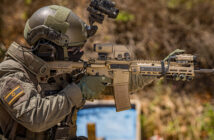
Las Vegas, Nev. (April 23, 2013) – Contactless payment card shipments are growing at the fastest rate since the technology was introduced in the early 2000s, according to figures released today by the Smart Payment Association (SPA) at the CARTES America conference, in its annual review of the smart payment card market.
Highlighting the growing enthusiasm of banks and payment providers in offering faster and more convenient ways to pay, contactless technologies were present on almost a quarter (23 percent) of all smart payment cards shipped in 2012. Western Europe and Asia Pacific regions saw the largest increases in contactless shipments with increases of 106 percent and 111 percent respectively compared with 2011.
Shipments of dual interface cards, incorporating both chip and PIN and contactless technologies, are now are growing at 77 percent year on year.
The data*, collated by the SPA – whose six members represent more than 85 percent of the total available market – also confirmed a 9 percent growth in the total number of smart payment cards shipped in 2012.
More than 975 million cards were shipped last year, with the highest climb recorded in the Asia Pacific region. China’s migration to chip-based payment cards heavily influenced the region’s 24 percent growth rate. Europe returned a buoyant 8 percent growth rate, but the major trend in this mature market was the move to contactless. Contactless card shipments in North America only increased by 1% with Canada representing most of that increase, as the U.S. continues the transition to EMV into 2014.
The focus on increased card security continued through 2012, with 56 percent of global shipments featuring Dynamic Data Authentication (DDA) or Combined Data Authentication (CDA) mechanisms – up from 47 percent in 2011. With attempts to combat card fraud always high on the agenda and the increasing adoption of contactless payments, the move to DDA/CDA technology in the more mature markets is a significant step in increasing payment security.
CISMEA & Eastern Europe, the Americas and Asia Pacific registered increases of 69 percent, 60 percent and 45 percent respectively in DDA/CDA-enabled card shipments.
SPA’s review of the smart payment market also highlights the growing importance of inter-agency collaboration to deliver the necessary convergence of contactless standards to support and accelerate the adoption of Near Field Communication (NFC) across markets. The SPA believes the harmonization of ISO, SEPA and EMVCo standards is critical to ensuring the global interoperability of new NFC contactless services for consumers.
According to Andreas Strobel, president of Smart Payment Association, “The data from this annual review points to a rapidly-changing payment marketplace. NFC contactless payment is becoming a priority, but without effective collaboration between global and regional standards bodies, the ability to deliver on consumer expectations will be constrained. SPA’s role is to help facilitate these discussions and support innovative new approaches to assure the industry is able to realize the tremendous opportunities that new technologies can bring.”
To download a copy of the SPA presentation, Unleashing the Power of Smart Payment, visit http://www.smartpaymentassociation.com/en/publications





